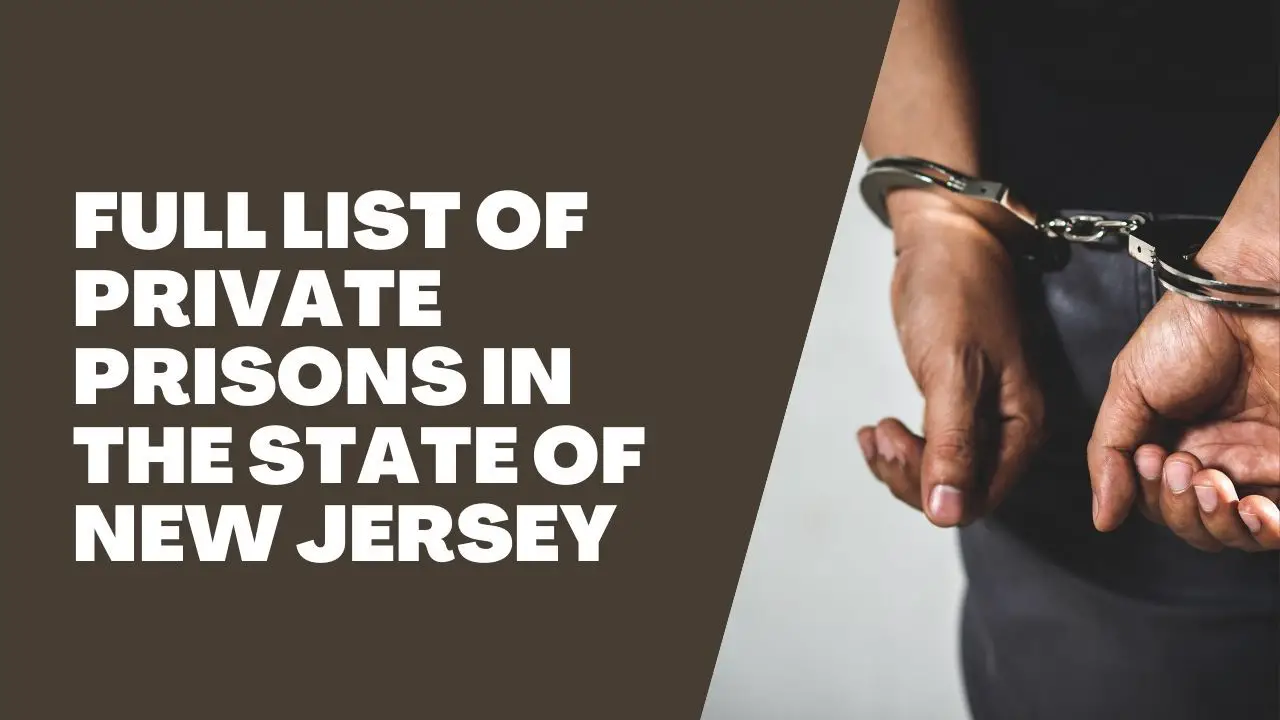Full List of Private Prisons in the State of New Jersey
If you want to know about the private prisons in the state of New Jersey, we have you covered!

New Jersey is one of the most well-known US states, situated at the center of the Northeast Megalopolis. It ranks eleventh on the population chart but has the fifth-smallest land area in the United States, making it the most densely populated region.
New Jersey has New York in its north and east, while the Atlantic Ocean covers the east, south, and southeast. It is the only state in which all counties are declared urban by the U.S. Census Bureau. Despite the high population, New Jersey has a medium incarceration rate of 341 per 100,000 people.
However, the prisons in New Jersey have also been home to federal and immigration detainees in private prisons. So, let's tell you about the prisons in the state of New Jersey.
Private Prisons in the USA
Managing a high population of prisoners in a country of 50 states is no joke. Most states have their state prisons, federal prisons, and county jails to keep the inmates before trial or after parole. However, the U.S. government realized the need for private prisons in the region quite early, leading to contracts for private prisons nationwide.
The federal government and twenty-seven state prisons incarcerated 96,370 people in private prisons in 2021, making for 8% of the total federal and state prison population.
So, private prisons have been quite helpful to federal and state governments in keeping offenders safe. Private prisons have helped reduce overcrowding, which could have been dangerous for the staff and other inmates.
Government has contracts with the GEO Group, Management and Training Corporation, Core Civic, and LaSalle Corrections to manage private prisons.
Yet the private prison landscape has changed, and most states are banning private prisons due to increasing expenses and improper facilities. While private prisons were meant to provide rehabilitation and correctional facilities to the inmates, many have been unable to deliver the promises.
New Jersey is also working on eliminating private prisons. Thus, recently the government did not renew CoreCivic’s contract for an immigrant detention facility. We’ll tell you about it later in the article.
Prison Statistics in New Jersey
24,000 people from New Jersey are behind bars, with 86,000 new incarcerations every year. Around 12,500 prisoners are in state prisons, while 7,900 are in local jails. Federal prisons house 2,300 offenders from New Jersey.
At the same time, 800 are in involuntary commitment, and 510 live in youth facilities. Out of all the prisoners in different facilities in New Jersey's criminal legal system, 120,000 are under probation, whereas 15,000 are under parole.
Compared to many other states with high incarceration rates, New Jersey's incarceration rate is way lower than the national average. Considering the prison statistics between 1978 and 2015, the number of incarcerations in New Jersey has decreased. Prison incarceration rates peaked in 1999 and have seen a downward shift afterward.
Private Prisons in New Jersey
New Jersey has a total of 22 county correctional facilities, with three residential reentry facilities that keep inmates on a contract basis.
As there are no privately run prisons in New Jersey besides these facilities, we are unable to provide a list of private prisons in the state of New Jersey.
Community Release Programs in New Jersey
While private facilities do not house criminals like federal and state prisons, they offer community release programs. These programs allow the prisoners to return to the community before being freed.
It enables them to become a part of the outside community easily, leaving this prison life behind.
The New Jersey Department of Corrections has contracts with for-profit (private) and nonprofit facilities for sixteen community-based programs. These include thirteen residential community release programs, two assessment and treatment centers, and one special needs program.
Inmates eligible to be released from their sentences are housed in these programs. However, they are still under the New Jersey Department of Corrections (NJDOC) and must follow the rules and regulations.
The community release programs in the New Jersey prison system include:
Assessment Centers
They offer a comprehensive assessment of inmates' needs and risks considering their behavior in prison. They also provide treatment regimens and substance use disorder treatment programs. Assessment centers may also refer inmates to a halfway house when needed.
Halfway Houses
Halfway houses are community release programs that act as the halfway between prison and out-of-prison life. They focus on helping inmates find jobs or indulge in educational activities for rehabilitation.
Mutual Agreement Programs
Assessment centers often refer inmates to mutual agreement programs that are community-based, residential substance use disorder treatment programs. These programs are licensed by the state and carried out throughout New Jersey.
Substance Use Disorder Programs
Substance use disorder programs focus on inmates with substance use and abuse who need immediate treatment. They have a specific emphasis on drug and/or alcohol abuse.
CoreCivic Sues New Jersey Over Prison Contracts Ban
CoreCivic is the world's largest private prison corporation that runs various private facilities across the U.S., including immigration detention centers. However, the company is suing Gov.
Phil Murphy and Attorney General Matt Platkin over a 2021 law. The law bans anyone from contracting with U.S. Immigration and Customs Enforcement to keep immigrant detainees.
CoreCivic filed a federal lawsuit claiming that the law signed in New Jersey in 2021 is unconstitutional under the Supremacy Clause. The lawsuit is related to the Elizabeth Detention Center in Union County, which houses immigrant detainees.
Prisons cannot renew contracts with ICE to house these inmates. Elizabeth Detention Center is the only remaining facility for ICE detainees, and this law would mean no facilities for immigrant detainees.
CoreCivic mentions, “Because CoreCivic provides essentially the entire immigration detention capacity for the federal government in New Jersey, the law would effectively shut down immigration detention in the state.”
The Elizabeth detention center capacitates around 300 people and employs about a hundred, primarily locals. It facilitates individuals detained at ports of entry at Newark and New York airports.
The company mentions that federal immigration law allows ICE officials to arrange detention centers while these individuals await removal hearings. Restricting the use of the Elizabeth detention center would not allow the same discretion to ICE regarding immigrant detainees.
Read Top 10 Worst Prisons in the World: From the US to China to Europe
Private Prisons Vs. New Jersey County Jail System
While the private, for-profit, and nonprofit facilities work to provide correctional community programs to the inmates, the county jails keep the inmates for a shorter time.
New Jersey has 22 county jails in 21 counties, with at least one jail in every. These county jails are responsible for the secure detention of offenders with pending case disposition or who have been charged with a crime.
They also have criminals sentenced to one year or less incarceration. The New Jersey county jail system has around 15,000 inmates in county jails across the state.
The operation of jails in different counties varies; jails in eight counties are managed under the Sheriff's Office, while the County Department of Corrections operates them in the other thirteen counties.
Read What is the percentage of African Americans in Prison in the U.S.?
The Bottom Line
New Jersey is the most densely populated state in the U.S. because of its high population and small area. Despite the high population, New Jersey has an incarceration rate of 341 per 100,000 people, less than half the national average.
Prisoners in New Jersey are housed in federal and state prisons and county jails, eliminating the need for private prisons. While there is no list of private prisons in the state of New Jersey, various for-profit and nonprofit private facilities in the region offer community and rehabilitation programs to inmates.
